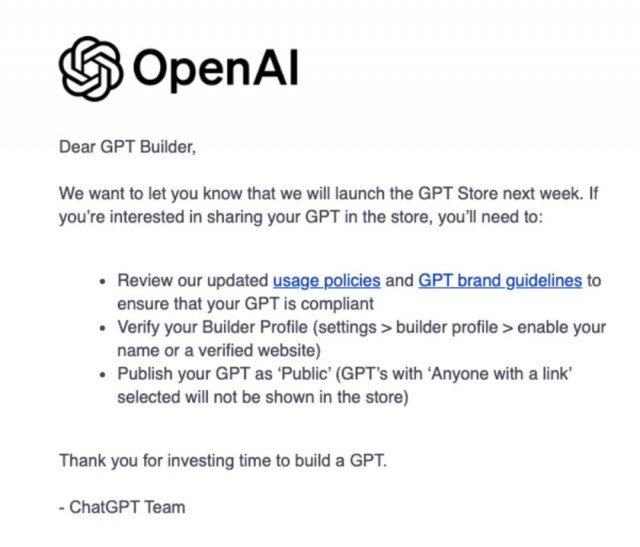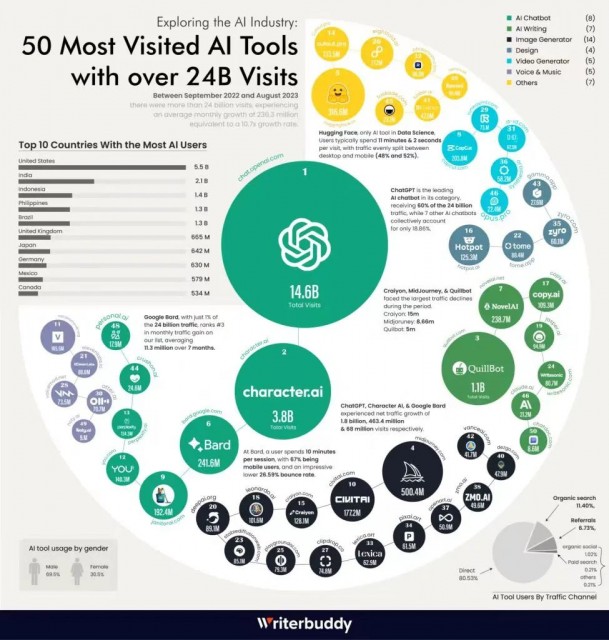Overnight.OpenAIA number of heavyweight announcements were made, sparking market interest.
January 5, 2012 - OpenAI released an email to all GPT developers this morning stating that a customized "GPT Store" will go live next week, which is expected to drive the development of the GPT Store.ChatGPTThe developer ecology continues to improve. It is reported that GPT Store is known asLarge Modelfield of the Apple App Store app store.
In Titanium Media's "What is 2023" year-end special dialog, "Zhao Hejuan talks to Wang Weijia and Zhang Hongjiang", Zhang Hongjiang predicted that with GPT-4 opening Plug-in, GPT will no longer be just a big model but a platform, which will completely replace App store and Google play.
Meanwhile, The information also revealed two important pieces of news about OpenAI last night and this morning: first, OpenAI is ready to compromise and has offered some U.S. news organizations $1-5 million per year for licensing news content for use in training models; second, OpenAI is discussing board member replenishment and has settled on two candidates, including Alexandr Wang, co-founder and CEO of Scale AI, and Nat Friedman, former CEO and investor in GitHub.

In fact, with ChatGPT, a hot chatbot platform, OpenAI, a company founded less than 9 years ago, has reached $1.6 billion in annual ARR revenue in 2023, a whopping 56-fold increase compared to last year, and the company is valued at $100 billion.
With the upcoming launch of the GPT Store and GPT-5, OpenAI is poised to become one of the most powerful "dark horses" in the tech industry by 2024.
Big Model's "App Store Moment" Comes Next Week
On January 5, EST, OpenAI released an email memo to all custom GPT developers, indicating that OpenAI plans to launch a "GPT Store" next week. The store will allow AI model developers to evolve into custom OpenAI chatbots for different purposes and formats, such as designing curriculum for high school teachers.
Back in early November 2023 at the first OpenAI developer conference, company CEO Sam Altman officially announced the GPT Store product, users do not need any code, the whole support visualization click operation, and the company predicted that month the GPT Store on the paid version of the Plus users open. However, two weeks after the launch, OpenAI was plunged into a leadership crisis, with Altman being repeatedly removed and returned. This "removal of the CEO incident" affected the overall development progress of the GPT Store, and the final product did not go live.
Sam Altman has said to the public that "some unexpected things have kept us busy."
Now multiple sources have confirmed that the GPT Store will arrive next week.
According to the introduction, GPT Store app store is a ChatGPT customization mode, users do not need any code, the whole process supports visual click operation. Users only need to submit dialog instructions, additional knowledge data, and then choose whether they need web search, data analysis and image generation and other developer products or functions, you can quickly develop legal, financial, medical and other specific areas of GPT assistant.
Specifically, first of all, users need to log in to https://chat.openai.com/auth/login and register a Plus account; secondly, after logging in to the account, you need to click on the "Explore" button on the upper left to enter the customization mode; again, the platform Once again, the platform will pop up a page, click on "Create a GPT" to start building a customized GPT, or to display other functions such as GPT Store; finally, click on "Create" to customize the GPT assistant, or to perform some more complex specific operations such as uploading a GPT to the GPT Store. Finally, by clicking "Create" to customize the GPT assistant, or perform some more complex specific operations such as uploading data and attachments, etc., finally through the GPT Builder to form their own customized GPT assistant, and as a private model or a public model to be saved, and put into the upcoming release of OpenAI's customized GPT store for sharing and so on.

OpenAI said the company plans to find a way to pay GPT creators based on the amount of API usage in the store, but has yet to announce any other details about the program.
The specifics of the email are as follows:
Dear GPT Developers.
We are excited to inform you that we plan to officially launch the GPT Store next week. If you expect to showcase your GPT work on this platform, please note the following:
Please carefully review and adhere to our newly updated Usage Policy and GPT Brand Guidelines to ensure your work meets our standards.
Please go to Settings > Developer Profile to verify your profile, which may include confirming your name or linking to a verified website.
Please set your GPT to "Public" status. GPTs that are set to "visible to anyone with a link" will not be displayed in the store.
We appreciate the valuable time and effort you put into building GPT and look forward to seeing your outstanding work online.
Bloomberg noted that with the launch of the GPT Store app store, it could threaten many AI startups that offer chatbot-like customization services.
Li Zhifei, founder and CEO of Going Out and Asking, has said that the OpenAI plug-in can connect ChatGPT with third-party applications, which can realize programs such as real-time scores of tournaments, stock prices, the latest information, buying airline tickets and wine tours, online shopping, and ordering takeout. He believes that this new species may be a "freak" that integrates content generation, search and recommendation, but it is a huge turning point for AI in any case. In the process of the continuous development of this new species, people need to have an open mind, do not try to understand it with the eyes of the past.
"A few days ago, Jen-Hsun Huang announced that the 'iPhone moment' for AI has arrived, and now there's talk of ChatGPT becoming the new operating system and already having its own app store." Li Zhifei said.
AI content licensing war going on at the same time
OpenAI rumored to offer up to $5 million for consultation
In addition to the upcoming launch of the GPT Store store, OpenAI is negotiating licensing agreements with dozens of organizations in order to address the issue of copyright infringement for AI model training content.
On the evening of January 4, Beijing time, according to The Information, OpenAI is in talks with as many as 12 U.S. content publishers, including The New York Times and other organizations, hoping to finalize agreements similar to those reached between OpenAI and the Associated Press, Politico parent company Axel Springer and other operators, and has already proposed to some of the organizations an annual licensing fee of between $1 million and $5 million. The report notes, however, that OpenAI's licensing fees have been reduced to between $1 million and $5 million per year. However, the report noted that it may be difficult to finalize a deal because OpenAI has offered less than expected.
According to Bloomberg, Tom Rubin, OpenAI's Chief of Intellectual Property and Content, said, "We're having a lot of consultations and discussions with a lot of content publishers. The negotiations are very active and very positive and are going well. You've seen the agreements that have been announced and there will be more to come." Axel Springer has now been paid tens of millions of dollars in licensing fees over several years.
Earlier, The New York Times Company announced that it was suing OpenAI and Microsoft, claiming that Microsoft and OpenAI were infringing on copyrights by using New York Times content in their products. The Times has attempted to negotiate an agreement to "ensure fair value for the use of its content," but negotiations have not yet resulted in a settlement, and The Information cited an executive as saying that more such lawsuits are expected (in the future).
In response, OpenAI said in a statement that it respects "the rights of content creators and owners and is committed to working with them to ensure they benefit from AI technology and new revenue models." The company said it was "surprised and disappointed" by the New York Times' lawsuit and "hopeful that we can find a mutually beneficial way to work together, as we have done with many other publishers."
Meanwhile, Apple and Google are also negotiating content licensing tools. According to The Information, Apple is finalizing AI deals with 12 U.S. news organizations, including NBC News, Conde Nast, the parent company of The New Yorker, and IAC, the parent company of The Daily Beast, and has offered to enter into a multiyear deal worth at least $50 million agreement; Google, on the other hand, has reached customized agreements with the New York Times and others for content algorithms and ad sharing.
For the generative AI industry, the fact that ChatGPT was sued by the New York Times suggests that it is increasingly important for big modeling techniques to obtain content licenses. Today, OpenAI is trying to take a broader view of content licensing in hopes of using relevant content to train GPT models in future AI products.
Geoffrey Manne, President and Founder of the Center for International Law and Economics, said that the New York Times' case against OpenAI was more persuasive than other lawsuits because of the verbatim examples the Times presented to the court. And with millions of registered articles, the Times ultimately wants OpenAI to pay more than $750 million in damages.
Additionally, in a Jan. 5 report, The information noted that OpenAI Inc. has begun a search for board member candidates, including Alexandr Wang, CEO and co-founder of Scale AI, and Nat Friedman, former CEO and investor of GitHub, both of whom are likely to join the The two are likely to join OpenAI's board of directors. But negotiations are still in the early stages, and the outcome could change.

Pictured left is Nat Friedman, pictured right is Alexandr Wang
Alexandr Wang, an MIT graduate who was selected as one of the top 20 physics students in the country in the U.S. Physics Olympiad, is now the co-founder and CEO of Scale AI and one of the youngest billionaires to start a company from scratch.He dropped out of college at age 19 to found Scale AI, and has previously held positions as a technology executive at Quora, among others. positions, Scale AI is currently valued at around $7 billion.
Alexandr Wang has had a long and multifaceted relationship with OpenAI. It dates back as far as 2016, when Alexandr Wang participated in the Y Combinator incubator, then led by Altman. OpenAI is also a Scale AI client. Additionally, individuals including Adam D'Angelo, CEO of Quora, Greg Brockman, President of OpenAI, and Friedman have all invested in Scale AI.
Nat Friedman was born in the U.S. and also graduated from the Massachusetts Institute of Technology.After Microsoft announced in June 2018 that it had acquired GitHub for $7.5 billion, Friedman became CEO of GitHub in October of that year.He stepped down from his position in November 2021. Since leaving Microsoft, Nat Friedman has worked primarily as a venture capitalist, currently investing in over 100 startups, including Scale AI.
As of now, OpenAI's board of directors consists of former Salesforce CEO Bret Taylor, former U.S. Treasury Secretary Larry Summers and Adam D'Angelo. Typically, OpenAI has nine seats on its board of directors, but it's unclear how many new members it is seeking to fill.
After over 24 billion visits worldwide, will the generative AI industry turn cold or continue to boom in 2024?
On December 30, The Information reported weekly that OpenAI's annualized revenue (ARR) has exceeded $1.6 billion in 2023, up over 56 times from $28 million in the full year of 2022, and generating at least $130 million per month thanks to the strong growth of ChatGPT. At this rate of growth, OpenAI management believes that by the end of 2024, OpenAI's annualized revenue could reach $5 billion or more.
In the past year, the emergence of ChatGPT not only set off a new round of AI craze, but also opened the prelude to the next era, and the world went crazy for it. Simply put, AI may be the biggest theme, if not the only theme, for the entire tech industry in 2023.
Recently, research firm Writerbuddy released data on more than 3,000 and ultimately shortlisted the world's top 50 AI tools products to reflect the AI industry's 80%+ traffic.
The report shows that from September 2022 through August 2023, the top 50 AI tools alone generated more than 24 billion visits, an average of 2 billion visits per month, and an average monthly increase of 10,701 TP3T (10.7x) to 236.3 million visits.

Of these, ChatGPT alone contributed 14.6 billion visits, ranking first and accounting for more than 60% of the analyzed traffic. Meanwhile, Americans contributed 5.5 billion visits to AI software, accounting for 22.62% of total visits, while European countries combined contributed 3.9 billion visits. In addition, more than 63% of AI tool users accessed them via mobile devices. In the gender data, 69.5% of the AI tools were male users, while 30.5% were female users.
According to the State of AI 2023 report produced by AI investor Nathan Benaich and the team at Air Street Capital, as of September 19, 2023, the number of AI unicorns in the world amounted to 473, with 315 in the U.S., 70 in China, and 27 in the U.K., and the total value of global AI unicorn companies amounted to $7.5 trillion , of which the total value of AI unicorn enterprises in the United States amounted to $5.9 trillion, and the total value of AI unicorn enterprises in China was $1.3 trillion.
With the big model explosion period of 2023 now behind us, the generative AI (AIGC) industry faces two expectations in 2024: it will either go cold or it will generate a wave of applications.
One of the reasons why the AIGC industry will become cold is that there is still a gap between domestic and foreign large models, while large models also need to face a "cooling period". Recently, Baidu founder, chairman and CEO Robin Li said, "China has a lot of big models, but the development of AI native applications based on big models is very little, and the continuous repeated development of basic big models is a great waste of social resources."
On the other hand, the industry generally believes that in 2024, AI technology productization, industrialization, as well as commercialization, will be the top priority for the development of big models. Fu Sheng, Chairman and CEO of Cheetah Mobile and founder of Orion Star, recently said that 2024 will be the wave year of AI big model application.
360 Group founder and chairman Zhou Hongyi gave four trends in the development of large models in 2024: first, large models will not be monopolized, its development path is more like the PC, the future will be ubiquitous; second, next year, the large models will not only pursue the "big" parameters, but also the pursuit of "small Secondly, next year, big models will not only pursue "big" parameters, but also "small" parameters, and small parameter models will soon be mounted on cell phones and all kinds of IoT devices; thirdly, multi-modal will become the standard of domestic big models, and in 2024, it will also make efforts in the direction of multi-modal; fourthly, a lot of vertical big models will appear in the country, and enter into hundreds of lines and thousands of industries, and develop in the direction of industrialization. In addition, he believes that next year, AIGC big model of text-to-map, text-to-video capabilities will get a breakthrough growth, as for what kind of C-terminal killer applications will be produced in 2024, it remains to be seen.
"I've been thinking lately that if you take a closer look at what Adobe, Microsoft and Google are doing, you'll find that in the future, AI may not be a technology that independently generates killer App (killer app), but a program that goes to enhance the already existing technology and process aspects. Therefore, in the future, whether it is To B or To C, all products will be reshaped by AI, but there is not necessarily a product that relies only on AI, AI still has to be combined with traditional business and products." Zhou Hongyi said.
Moreover, the trend will also influence the domestic AI Big Model investments in 2024. "In the field of AI big models, technology leadership and differentiation will become the key to competition. Investors will have to pay more attention to technological innovation and R&D capabilities, and look for projects that can provide better quality products and services." Yuan Shuai, deputy secretary general of Zhongguancun Internet of Things Industry Alliance and executive director of the Specialized and Specialized New Enterprises Quality Development Promotion Project, said.
"We think tech stocks will rise 25% in 2024," wrote Dan Ives, a tech analyst at Wedbush, in a report, adding, "Wall Street and the tech community are waiting for the 'Year of AI's coming."
Ives believes that 2024 will be the "Year of AI" and that tech stocks will rise at least 251 TP3T, and possibly even 351 TP3T.
David McCurdy, CTO of Insight Enterprises, said, "As we move into 2024, virtually all business leaders are focusing on how AIGC technology can reshape their operational business and create new business models."
Yuan Shuai emphasized that in 2024, investment in China's big AI models will pay more attention to the commercial application prospects and business model innovation of the projects, and look for projects that can bring actual revenue and market share growth. Meanwhile, the expansion of commercial application scenarios will become another important direction for investment.